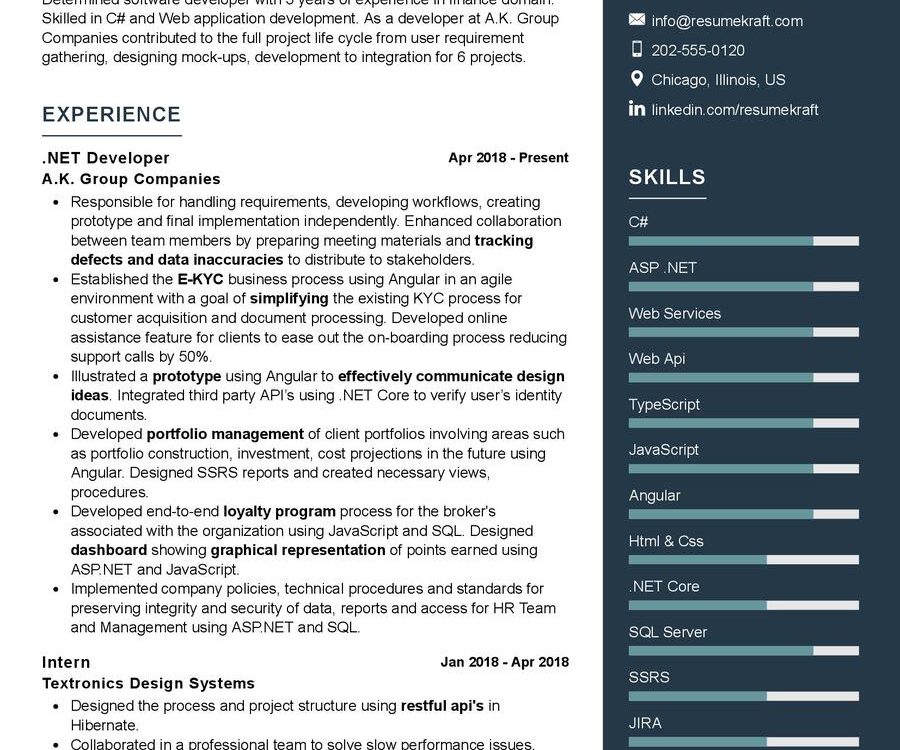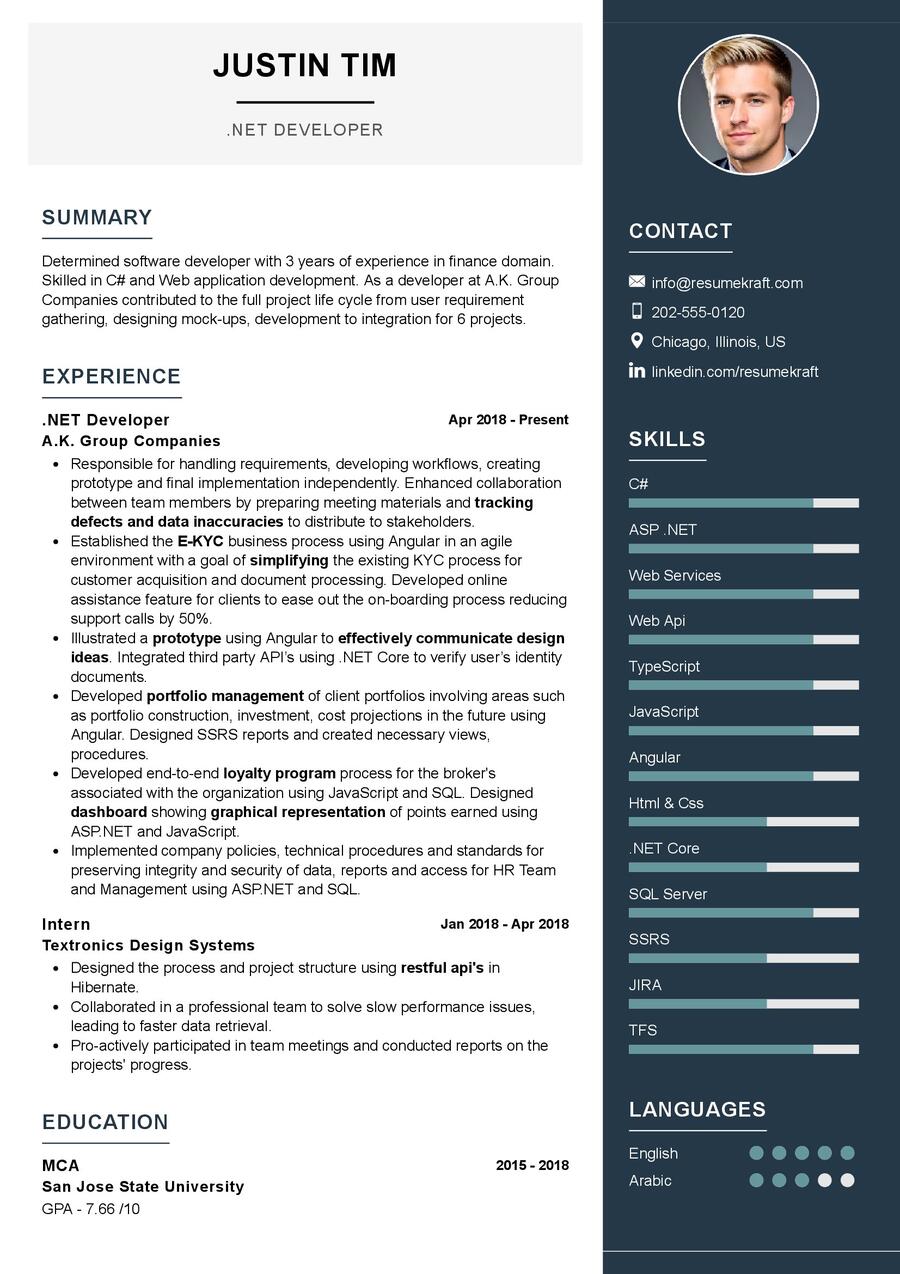The Crucial Role of a .NET Developer in Today’s Tech Landscape
As the digital realm advances at an unprecedented pace, the significance of a .NET Developer has soared, making this role integral to the success of tech-driven enterprises globally. A .NET Developer is not just a coder; they are architects of digital solutions, weaving together the intricacies of technology to create robust and scalable applications. Let’s delve into the diverse and dynamic role of a .NET Developer, exploring the technical expertise and leadership skills required for success in this evolving landscape.
Key Responsibilities of a .NET Developer
A .NET Developer’s responsibilities encompass a spectrum of tasks, from coding to optimizing and maintaining applications. Their role is multifaceted, demanding a profound understanding of the .NET framework and its applications. Let’s unravel the key responsibilities that define the day-to-day tasks of a .NET Developer:
- Designing and developing high-performance applications using the .NET framework, ensuring functionality and scalability.
- Collaborating with cross-functional teams to understand project requirements and translate them into efficient code.
- Optimizing application performance, conducting thorough testing, and debugging to guarantee seamless user experiences.
- Staying abreast of the latest trends and updates in .NET development to integrate innovative solutions into projects.
- Participating in the entire application lifecycle, from concept and design to testing, deployment, and maintenance.
- Ensuring code quality through regular code reviews and adherence to coding standards.
- Providing technical support and troubleshooting for applications, addressing issues promptly to maintain optimal functionality.
Each responsibility demands a blend of technical acumen, problem-solving skills, and a commitment to delivering high-quality applications.
Qualifications and Skills Required for a .NET Developer Role
Becoming a proficient .NET Developer requires a combination of education, practical experience, and a diverse skill set. Let’s explore the qualifications and skills essential for thriving in this dynamic role:
- A Bachelor’s or Master’s degree in Computer Science, Software Engineering, or a related field, providing a solid foundation in the fundamentals of programming.
- Proficiency in languages like C# and VB.NET, with a deep understanding of the .NET framework.
- Hands-on experience in developing web applications, desktop applications, and APIs using .NET technologies.
- Knowledge of database systems, particularly SQL Server, for efficient data management within applications.
- Familiarity with front-end technologies such as HTML, CSS, and JavaScript for holistic application development.
- Strong problem-solving skills and attention to detail, crucial for identifying and rectifying coding issues.
- Effective communication skills to collaborate with team members and stakeholders throughout the development process.
Continuous learning and staying updated with emerging technologies are vital for a .NET Developer’s sustained success in this ever-evolving field.
Crafting an Impactful .NET Developer CV
Your .NET Developer CV is more than just a document; it’s your professional narrative that showcases your skills and experiences. To make your CV stand out in a competitive job market, consider the following tips:
- Highlight your hands-on experience with specific .NET technologies, detailing the projects you’ve contributed to and their outcomes.
- Quantify your achievements where possible, such as improving application performance, reducing bugs, or enhancing user experiences.
- Showcase your adaptability by discussing how you’ve embraced new technologies or methodologies in your projects.
- List relevant certifications, demonstrating your commitment to continuous learning and staying current in the field.
- Customize your CV for each job application, emphasizing the skills and experiences most relevant to the specific role.
Your .NET Developer CV is your personal marketing tool, so make it compelling and tailored to position yourself as the ideal candidate.
Building a Strong Professional Experience Section
Your professional experience section is the heart of your .NET Developer CV, providing a detailed account of your journey and contributions. Here are examples to guide you in crafting this crucial section:
- “Led the development of a customer-facing web application, resulting in a 30% increase in user engagement and satisfaction.”
- “Contributed to the optimization of a legacy system, reducing response time by 25% and enhancing overall application performance.”
- “Collaborated with a cross-functional team in the successful deployment of a complex API, facilitating seamless data integration across platforms.”
Each experience is a testament to your skills and contributions, providing potential employers with a clear understanding of your impact.
Educational Background for a .NET Developer
Your educational journey is a critical part of your .NET Developer story, reflecting your foundation and commitment to excellence. Here’s how you can present your educational background:
- Master of Science in Computer Science, XYZ University, a comprehensive program that honed my analytical and problem-solving skills, 2018.
- Bachelor of Technology in Software Engineering, ABC University, where I developed a strong foundation in programming languages and software development principles, 2015.
- Microsoft Certified: .NET Developer, showcasing my commitment to mastering .NET technologies and staying at the forefront of industry standards, 2019.
Your education is a testament to your dedication to learning and adapting to the evolving landscape of technology.
Essential Skills for a .NET Developer CV
Your skill set is your toolkit, essential for creating innovative and efficient applications. Let’s break down the crucial skills that a .NET Developer should possess:
Soft Skills:
- Collaboration and teamwork, essential for working effectively with cross-functional teams.
- Communication skills, enabling effective conveyance of complex technical concepts to non-technical stakeholders.
- Problem-solving abilities, crucial for identifying and resolving coding issues and optimizing application performance.
- Attention to detail, ensuring the creation of high-quality, error-free code.
- Adaptability, allowing you to stay agile in the face of evolving project requirements and technologies.
Hard Skills:
- Proficiency in C# and VB.NET, the foundational languages for .NET development.
- Expertise in web and desktop application development using the .NET framework.
- Database management skills, particularly in SQL Server, for effective data handling.
- Familiarity with front-end technologies like HTML, CSS, and JavaScript.
- Version control using tools like Git for efficient collaboration and code management.
Each skill in your toolkit contributes to your ability to create impactful and efficient applications as a .NET Developer.
Common Mistakes to Avoid in Your .NET Developer CV
While crafting your .NET Developer CV, steer clear of common pitfalls that can hinder your chances of landing the ideal job. Here are mistakes to avoid:
- Using generic terms without providing specific examples of your contributions to projects.
- Omitting quantifiable achievements, missing an opportunity to showcase the impact of your work.
- Neglecting to customize your CV for each application, potentially overlooking key skills and experiences relevant to the role.
- Overloading your CV with technical jargon, making it challenging for non-technical recruiters to understand your value.
- Skipping the proofreading process, as errors can diminish the professionalism of your CV.
Avoiding these common mistakes ensures that your .NET Developer CV is polished and effectively communicates your expertise and potential.
Key Takeaways for Your .NET Developer CV
As we conclude this comprehensive guide, remember these key takeaways to craft a .NET Developer CV that stands out:
- Emphasize your hands-on experience and specific achievements to demonstrate your impact.
- Highlight your adaptability to new technologies and methodologies, showcasing your ability to stay ahead in a dynamic industry.
- Customize your CV for each application, tailoring it to highlight the most relevant skills and experiences.
- Include certifications and continuous learning initiatives, showcasing your commitment to staying current in the field.
Finally, feel free to utilize resources like AI CV Builder, CV Design, CV Samples, CV Examples, CV Skills, CV Help, CV Synonyms, and Job Responsibilities to create a standout application and prepare for the .NET Developer job interview questions.
Armed with these insights and tips, you are now ready to craft a .NET Developer CV that is not just a document but a compelling narrative of your expertise, experiences, and aspirations. Best of luck!


